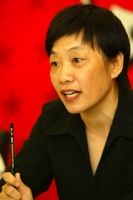
The creators of The First Emperor were clearly intent on sharpening the film’s (already pretty clear) political stance. “Qin Shi Huangdi was pretty much like Mao Zedong,” Tan Dun told Martin Steinberg of The Associated Press. “He unified China. He made the language, made the measuring system, made the currency. … But on the other hand, imagine how many other kingdoms’ tribes he wiped out, how many other languages he destroyed, and the culture and books burned by him.”
That’s the dilemma The First Emperor summons the passion to explore: the uneasy, sometimes fatal relationship between art and government, the composer and the tyrant. You can expect that of Zhang Yimou, who suffered serious censorship restrictions on many of his early films, but who is now in charge of the entertainment for the 2008 summer Olympic games in Beijing. In this sense, even those he has staged it half a world away, The First Emperor is a risky statement, a declaration of war ” a war of nerve ” against the Emperor, the Chairman or the censor. [Full Text]
“Hero,” Zhang Yimou’s first martial arts movie which is also based on the story of Qin Shi Huangdi, came out four years ago. The following excerpts are from Chinese movie critic Cui Weiping’s recent blog post, translated by CDT. Professor Cui teaches at the Beijing Film Academy:
On at least three levels, “The Hero” violated the “consensus” of today’s Chinese audience. First, ordinary people’s common judgment, which has lasted for thousands of years, that Qin Shi Huangdi was a tyrant, and that tyrants should be condemned. Although the aspiration for a benevolent ruler implied in this view is still a longing under autocratic rule, the condemnation of tyranny is universal. However, the movie “Hero” is intended to reverse the pubic view towards Qin Shi Huangdi, and goes against the sentiment of the audience. “Hero” is based on a stance that reverses the judgment towards tyrants. It takes the perspective not of the majority but of a tiny group of people.
Second, ordinary people’s general view of martial arts heroes. You have to pay a price for the so-called “wandering in the wilderness”, but by paying the price you free your heart and spirit, and realize the desire to be in charge of your own life. People’s general yearning for martial arts and acceptance of it are based on this longing for freedom. But in “Hero,” when Can Jian and Wu Ming give up their idea of assassinating Qin Shi Huangdi, ostensibly it marks a transcendence of their personal hatred. However, in reality it coincides with the emperor’s personal ambition, that “the world under heaven” is the world ruled by the “son of heaven,” and that consideration of the benefits of “the world under heaven” is the consideration for the benefit of the “son of heaven.” The film makes no secret of this view, which is expressed from the mouth of Qin Shi Huangdi: I didn’t expect that “the one who knows me best,” “the soul mate” who “echoes my wants and mind” is the one “wandering the wilderness” (ʱüÊπñ‰∏≠‰∫







